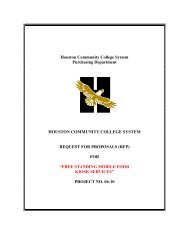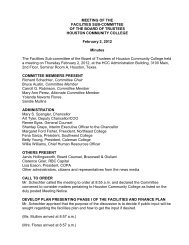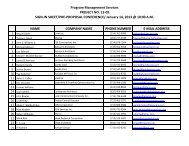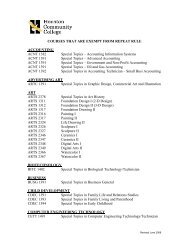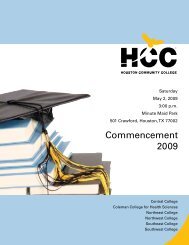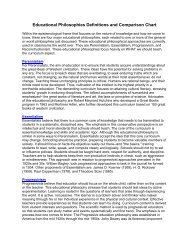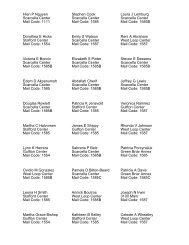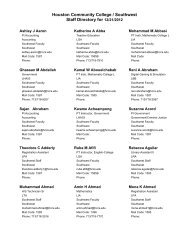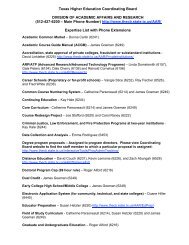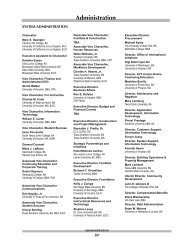General Course Descriptions - Houston Community College System
General Course Descriptions - Houston Community College System
General Course Descriptions - Houston Community College System
You also want an ePaper? Increase the reach of your titles
YUMPU automatically turns print PDFs into web optimized ePapers that Google loves.
tVB 2486 internsHip–rAdio<br />
And teleVision BroAdCAsting<br />
prerequisite: rtVB 1317 and department<br />
Approval<br />
Credit: 4 (21 lab)<br />
A work-based learning experience that enables the<br />
student to apply specialized occupational theory,<br />
skills and concepts . A learning plan is developed by<br />
the college and the employer .<br />
russ 1300 Beginning russiAn<br />
ConVersAtion i<br />
Credit: 3 (3 lecture)<br />
An introductory Russian course which emphasizes<br />
listening comprehension and speaking skills . Reading<br />
and writing may be done as reinforcement to oral<br />
communication skills . The course is slower-paced and<br />
less comprehensive than Russian 1411 . This course<br />
is highly recommended for students without previous<br />
experience in the Russian language . It is not open to<br />
students whose first language is Russian . <strong>General</strong>ly,<br />
does not transfer as foreign language credit, but may<br />
transfer as elective credit .<br />
russ 1310 Beginning russiAn<br />
ConVersAtion ii<br />
prerequisite: russ 1311 or equivalent<br />
Credit: 3 (3 lecture)<br />
Continuation of RUSS 1311 . Emphasizes oral<br />
communication skills . <strong>General</strong>ly, does not transfer as<br />
foreign language credit, but may transfer as elective<br />
credit . Students who continue the study of Russian<br />
following this course must take RUSS 1411 .<br />
russ 1411 Beginning<br />
russiAn i<br />
prerequisites: Must be placed into gust<br />
0342 (or higher) in reading and engl<br />
0310/0349 (or higher) in writing.<br />
Credit: 4 (3 lecture, 2 lab)<br />
Introduction to Russian language and culture .<br />
Development of basic skills in listening comprehension,<br />
speaking, reading, writing, and cultural awareness .<br />
<strong>Course</strong> includes vocabulary building, conversation<br />
and grammar . Transfers as foreign language credit .<br />
Core Curriculum <strong>Course</strong> .<br />
russ 1412 Beginning<br />
russiAn ii<br />
prerequisite: russ 1411 or satisfactory<br />
score on an advanced placement<br />
examination or at least 2 years of high<br />
school russian within the last two years<br />
prerequisites: Must be placed into gust<br />
0342 (or higher) in reading and engl<br />
0310/0349 (or higher) in writing.<br />
Credit: 4 (3 lecture, 2 lab)<br />
Continuation of russ 1411.<br />
Further development of listening comprehension,<br />
speaking, reading, and writing skills, and cultural<br />
awareness . More advanced grammar . Transfers as<br />
foreign language credit . Core Curriculum <strong>Course</strong> .<br />
russ 2311 interMediAte<br />
russiAn i<br />
prerequisite: russ 1412 or equivalent<br />
prerequisites: Must be placed into gust<br />
0342 (or higher) in reading and engl<br />
0310/0349 (or higher) in writing.<br />
Credit: 3 (3 lecture)<br />
Further development of listening, speaking, reading<br />
and writing skills and cultural awareness acquired in<br />
Beginning Russian . Study of more complex language<br />
structures . Oral and written practice based on readings<br />
and dialogues . Directed composition . Class conducted<br />
largely in Russian . Core Curriculum <strong>Course</strong> .<br />
russ 2312 interMediAte<br />
russiAn ii<br />
prerequisite: russ 2311 or equivalent<br />
prerequisites: Must be placed into gust<br />
0342 (or higher) in reading and engl<br />
0310/0349 (or higher) in writing.<br />
Credit: 3 (3 lecture)<br />
Continuation of RUSS 2311 . Oral practice and<br />
compositions based on readings . Class conducted<br />
mainly in Russian . Core Curriculum <strong>Course</strong> .<br />
sCit 1407 HuMAn AnAtoMy And<br />
pHysiology i<br />
Credit: 4 (4 lecture, 1 lab)<br />
In-depth coverage of the structure and function of the<br />
human body . Topics include cell structure and function;<br />
tissues; body organization; and the integumentary,<br />
skeletal, muscular, nervous, and endocrine systems .<br />
Emphasis on homeostasis .<br />
sCit 1408 HuMAn AnAtoMy And<br />
pHysiology ii<br />
prerequisite: sCit 1407<br />
Credit: 4 (4 lecture, 1 lab)<br />
A continuation of Human Anatomy and Physiology I<br />
with in-depth coverage of the structure and function<br />
of the human body . Topics include the digestive,<br />
respiratory, cardiovascular, lymphatic, immune,<br />
excretory, and reproductive systems . Emphasis on<br />
homeostasis .<br />
sCit 1414 Applied generAl<br />
CHeMistry i<br />
prerequisite or corequisite: MAtH 1314<br />
Credit: 4 (3 lecture, 3 lab)<br />
Study of the general concepts of chemistry with an<br />
emphasis on industrial applications . The student<br />
will measure physical properties of matter, perform<br />
chemical calculations, describe atomic and molecular<br />
structure, distinguish periodic relationships of<br />
elements, name and write inorganic formulas, write<br />
equations for chemical reactions, demonstrate<br />
stoichiometric relationships, and demonstrate basic<br />
laboratory skills .<br />
sCit 1415 Applied generAl<br />
CHeMistry ii<br />
prerequisite: sCit 1414<br />
Credit: 4 (3 lecture, 3 lab)<br />
A continuation of Applied <strong>General</strong> Chemistry I with<br />
emphasis on solids, liquids, gases, solutions, energy<br />
changes, reaction rates, and chemical equilibrium .<br />
The student will describe properties of solids, liquids,<br />
gases, and solutions; measure and interpret energy<br />
changes, reaction rates, and chemical equilibrium;<br />
utilize acid/base chemistry and oxidation/reduction<br />
reaction concepts; and demonstrate laboratory<br />
techniques with industrial applications .<br />
<strong>Course</strong> desCriptions<br />
298<br />
sCit 1418 Applied pHysiCs i<br />
prerequisite: MAtH 1314<br />
Credit: 4 (3 lecture, 3 lab)<br />
An introduction to physics for students who have limited<br />
backgrounds in science and mathematics . Topics<br />
include motion, solid mechanics and fluid mechanics,<br />
properties of matter, heat, and thermodynamics .<br />
sCit 1543 Applied AnAlytiCAl<br />
CHeMistry<br />
prerequisite: sCit 1414, MAtH 1314 or<br />
department Approval<br />
Credit: 5 (3 lecture, 4 lab)<br />
Instruction in gravimetric and titrimetric analysis<br />
of practical samples by classical and standard<br />
methods . The student will collect and prepare<br />
representative samples, perform gravimetric and<br />
titrimetric procedures, evaluate analytical data<br />
statistically, and prepare appropriate documentation .<br />
sCit 2401 Applied orgAniC<br />
CHeMistry i<br />
prerequisite: sCit 1414 or<br />
department Approval<br />
Credit: 4 (2 lecture, 4 lab)<br />
An overview of the classification, characteristics, and<br />
structure of carbon compounds and an introduction<br />
to basic organic laboratory techniques . The student<br />
will name compounds and write structural formulas;<br />
describe physical properties; write equations for<br />
organic reactions; describe selected industrial<br />
organic chemical sources, uses, and production;<br />
and synthesize, separate, purify, and identify organic<br />
compounds .<br />
sCit 2402 Applied orgAniC<br />
CHeMistry ii<br />
prerequisite: sCit 2401<br />
Credit: 4 (2 lecture, 4 lab)<br />
Continuation of Applied Organic Chemistry I with<br />
greater emphasis on reaction mechanisms and<br />
synthetic methods . The student will name compounds<br />
and write structural formulas; describe physical<br />
properties; write organic reaction equations including<br />
multi-step synthesis; describe selected industrial<br />
organic chemical sources, uses, and production;<br />
describe reaction mechanisms; and synthesize,<br />
separate, purify, and identify organic compounds .<br />
sCWK 1391 speCiAl topiCs in<br />
soCiAl WorK<br />
Credit: 3 (3 lecture)<br />
Topics address recently identified current events, skills,<br />
knowledge, and/or attitudes and behaviors pertinent<br />
to the technology or occupation and relevant to the<br />
professional development of the student .<br />
sCWK 2307 HuMAn BeHAVior<br />
And tHe soCiAl enVironMent<br />
Credit: 3 (3 lecture)<br />
A basic framework for creating and organizing<br />
knowledge of human behavior and the social<br />
environment . Introduction of social system, life span,<br />
and strength approaches to understanding human<br />
behavior and environmental impact . Emphasis on<br />
the impact of human diversity, discrimination, and<br />
oppression on the individual’s ability to reach or<br />
maintain optimal health and well-being .



